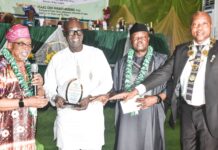

The Minister of Power, Works and Housing, Mr. Babatunde Fashola SAN, Thursday inaugurated the Chairman of the Nigerian Electricity Regulatory Commission (NERC) charging the Commission to focus more on Customer Service as the critical component that would move the Power Sector forward.
Speaking after the brief but colourful ceremony at the Conference Room of the Ministry, Fashola, who said Customer Service was a challenging bridge that must be crossed, said it was the duty of the Commission to make Consumers understand what was going on with their metering, what are their rights and so on and so forth as well as who to hold accountable when things went wrong with service delivery.
The Minister told the new NERC Chairman, Professor James Momoh, “Consumers must understand what is going on with their metering, what are their rights and so on and so forth; who do they hold accountable, where are the NERC field offices to which they can complain; what is the process of getting remediation for service that is not in sufficient quantity and of quality?”
Promising to make himself available to render assistance in terms of “policy guidelines, policy directions and helping to move the wheel of bureaucracy to make progress to get the work done”, he added that the Commission also had to do a lot of enlightenment among the customers in terms of making them understand who and where to complain when they needed service.
“I want to thank the Permanent Secretary and all the members of the team. I continue to receive those text messages; I like to thank the Director of Distribution and her team; they are the ones I send those texts of complaints, ‘Our meter has failed, etc’ and they respond as best they can all over the country and I get feedbacks from those who have received service”, he said.
Fashola, who described the Commission as the Policeman of the Power Sector, expressed delight that it now has the full complement of its membership with a Chairman, added, “I am one of the happiest people today and I will tell Nigerians why. Since Privatization took place, one of the things that have happened is that the size of the Ministry of Power shrank significantly”.
“I think our staff strength before I came was in the region of 15,000 and all of that is now less than a thousand people because most of the staff some retired as a consequence of the Privatization and transfer of ownership to the GenCos and the DisCos. Today, unlike the old Power Holding Company of Nigeria (PHCN), this Ministry does not own any Gencos or DisCos”, he further explained adding that the Ministry only supervises the Yola Disco where, according to him, privatization became problematic and force majeure was declared.
According to the Minister, “The truth is that we don’t buy meters and we don’t supply meters. Really and truly our role now is just to make policies; our quality of energy, type of energy; whether it is hydro, thermal, and solar or wind and to make sure that if there are problems we go and solve them. And that is in terms of government activities”.
Reiterating that owners of the power assets today are the GenCos and DisCos, Fashola pointed out that the power industry was now a business where the aforementioned investors are now responsible for providing electricity to Nigerians, adding, “The owners of the DisCos are the ones who now have the challenge and responsibility of distributing electricity to Nigerians”.
The Minister added that the Transmission Company of Nigeria (TCN), owned by the government, was now run as a business to transmit electricity pointing out that all of the organizations, both private and public, were subject to the regulatory power of NERC whose Chairman was being inaugurated. “So that is the Policeman of the Power Industry”, he said.
Describing Metering as a “big issue” in the industry, Fashola, who noted that the Commission has already issued regulations concerning the problem promised that government was working hard on how quickly meters could come, adding that for those people not connected to the grid, NERC has also issued regulations for mini-grids and how it would happen.
The Minister thanked the Commissioners of NERC for their collaborative working relationship without a substantive Chairman adding, “I value the work that you do; but sadly I just have to ask you to do more. Nigerians need to experience the full benefit that Privatization can bring. I am convinced that it will happen. Irrespective of what we see, what matters most now is what people are experiencing”.
He expressed delight that between 2015 and now, many consumers have experienced better supply by way of having power for longer hours compared with before, buying less diesel and running their generators for shorter periods adding, however, that in some places people would still say that their experience was not good. “So that means there is still a lot of work to do”, he said.
On the progress being made in the sector, Fashola declared, “By increasing generation to 7,000MW, increasing transmission to over 7,000MW and increasing distribution from 2,690MW to an average of 4,900MW and 5,000MW, clearly that is progress and that is what we must do more”.
The Minister, who acknowledged that there were challenges that came with the Privatization of the industry such as metering and governance issues, said that was why government came up with the Power Sector Recovery Programme (PSRP) as a component of its Economic Recovery and Growth Plan (ERGP) to solve the challenges and put the sector on the path of sustainable growth.
“What we see is that like every policy, Privatization will have its challenges. We have gathered all the challenges together and that is what we have put in the PSRP; from meters to governance and one of the governance issues is the full constitution of the NERC with the appointment of the Chairman and today one item in the list of to-do items of the PSRP is now completed and we can proudly report that”, he said.
The Minister said, having solved that governance problem, other items to be faced include metering and expansion of distribution network adding that although there is an existing capacity of 2,000MW of power that could not be distributed, government was working to see what it could do quickly to solve the problem before the end of the year.
He disclosed that the Azura Power in Edo State just sent a message that their plant was now completed and was ready to run full operation, adding, “That is 459 MW of power. We are expecting another 240 MW from Afam and another 215 MW from Kaduna and also from Kashimbila. There is a lot of power coming. So, the distribution end is where our real challenge lies”.
The Minister, who noted that the mini-grid regulations issued recently by NERC have started producing results with impacts in markets, pointed out that later this year, places like Sura Market in Lagos, Sabon Gari Market in Kano, Ariaria Market in Aba and about 13 other markets across the country were going to be energized.
“So the progress we are making inspires us to continue. It reinforces the methods that we have formulated and the choices that we have made, that clearly we are on the right part. This is clearly an elephant and so we are going to break it bit by bit because you can’t eat an elephant whole”, he said.
Thanking President Muhammadu Buhari for the choice of Professor Momoh as Chairman of NERC, Fashola also thanked the Chairman for deciding “to find his way home to come and be part of fixing what may be wrong instead of pointing fingers at what is wrong”.
“I think that it is always easy to complain about what is wrong; but it is much more challenging to volunteer to be part of the problem solving team and that is what Professor Momoh has done in accepting this nomination to serve his country”, the Minister said adding that the new Chairman while needing the help of God in fulfilling his oath of office would also need his own resolve, the help of his wife, friends and family for the same purpose.
Also singled out for special thanks were the Vice-Chairman of the Commission, Mr. Sanusi Garba, who also acted as Chairman in the absence of the substantive Chairman, Mr. Frank Okafor, Mr. Musiliu Oseni and other commissioners of the Commission who held the fort till the inauguration as well as the Senate who, according to him, although they delayed the confirmation, “It is better late than never”.
In his acceptance remarks, the new Chairman, Professor James Momoh, pledged to abide by the oath of office which he had earlier taken, adding that he was proud to return and serve his country in the capacity he had been chosen after serving in the United States for so many years.
“I understand that I have been given a trust. My job is a trust. I want to assure you that I am a team player. I will work with the Commissioners of NERC; I will work with the Ministry and I will work with the legislative arm of government so that together we will forge a relationship where we understand we have been given a trust to move the power sector to the next level”, he said.
Also present at the occasion were the Vice Chairman of NERC and other Commissioners of the Commission while on the Ministry’s side were the Permanent Secretary Power, Mr. Louis Edozien, Directors and Special Advisers to the Minister.





